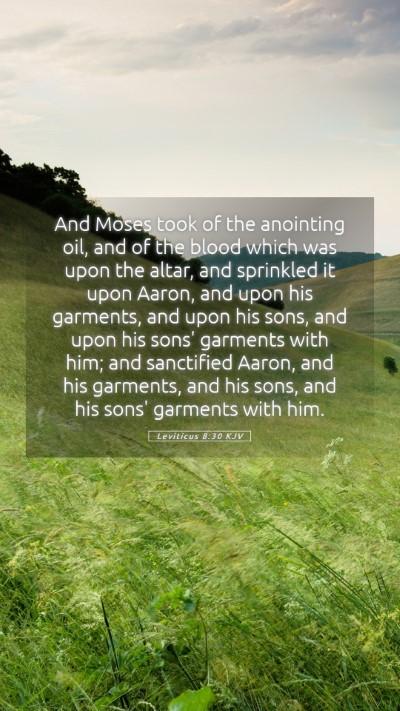Understanding Leviticus 8:30: A Comprehensive Analysis
Leviticus 8:30 states, "And Moses took of the anointing oil and of the blood which was upon the altar, and sprinkled it upon Aaron, and upon his garments, and upon his sons, and upon the garments of his sons with him, and consecrated Aaron, and his garments, and his sons, and the garments of his sons with him." This verse holds a significant place in the ceremonial consecration of Aaron and his sons as priests, serving as an integral part of the Levitical priesthood.
Significance in Worship and Sacrifice
In biblical terms, the act of anointing and sprinkling blood signifies a deep connection between divine approval and human leadership in worship. It emphasizes that God’s presence rests squarely on those appointed to stand between Him and His people.
- Taking the Anointing Oil: The anointing oil is indicative of being set apart for God’s service. It symbolizes empowerment and the presence of the Holy Spirit.
- Blood of the Altar: The use of sacrificial blood represents atonement and purification, necessary for anyone who serves in God’s holy presence.
- Sprinkling Action: The act of sprinkling signifies a physical manifestation of divine grace and acceptance, ensuring that the priests are fit for their sacred duties.
Biblical Commentary Insights
Various public domain commentaries provide valuable insights into the meaning of this verse:
- Matthew Henry: He emphasizes the ceremonial nature of this consecration, noting that it symbolizes the necessity of preparation and holiness for ministerial duties before God.
- Albert Barnes: Barnes discusses the significance of blood in the sacrificial system, highlighting that the priests' consecration through blood emphasizes their role in mediating for the people.
- Adam Clarke: Clarke expands on the symbolism of anointing and blood, suggesting that this act not only prepares the priests but also points forward to Christ's ultimate sacrifice and anointing.
Theological Implications
Leviticus 8:30 conveys profound theological implications regarding:
- Holiness: The priests must embody holiness as they engage in their sacred roles.
- Leadership: God establishes a structured leadership model, with priests standing as mediators between the divine and the community.
- Covenantal Relationships: The anointing is part of God’s covenant with His people, ensuring that worship is conducted appropriately.
Practical Applications
For today’s believers, the applications of this verse can be significant:
- Sanctification: Individuals are reminded of the need for personal sanctification and dedication to God’s work.
- Understanding Leadership: This verse underscores the importance of recognizing the spiritual authority in church leadership.
- Engagement with Scripture: It encourages deeper engagement with Scripture regarding its rituals and their meanings, valuable for online Bible study and Bible study groups.
Cross References
Leviticus 8:30 is closely related to several other scripture passages, including:
- Exodus 29:21: The consecration of the priests.
- Hebrews 9:22: The significance of blood in the new covenant.
- 1 Peter 2:9: The priesthood of all believers.
Conclusion
In summary, Leviticus 8:30 illustrates the profound importance of consecration in serving God and connecting the community to divine worship. Through careful examination of this verse, one gains insights into the priestly duties, the nature of sacred responsibilities, and the profound symbolism of anointing and blood. Understanding such important scripture contributes to our overall Bible study insights and enhances our understanding of Scripture.


